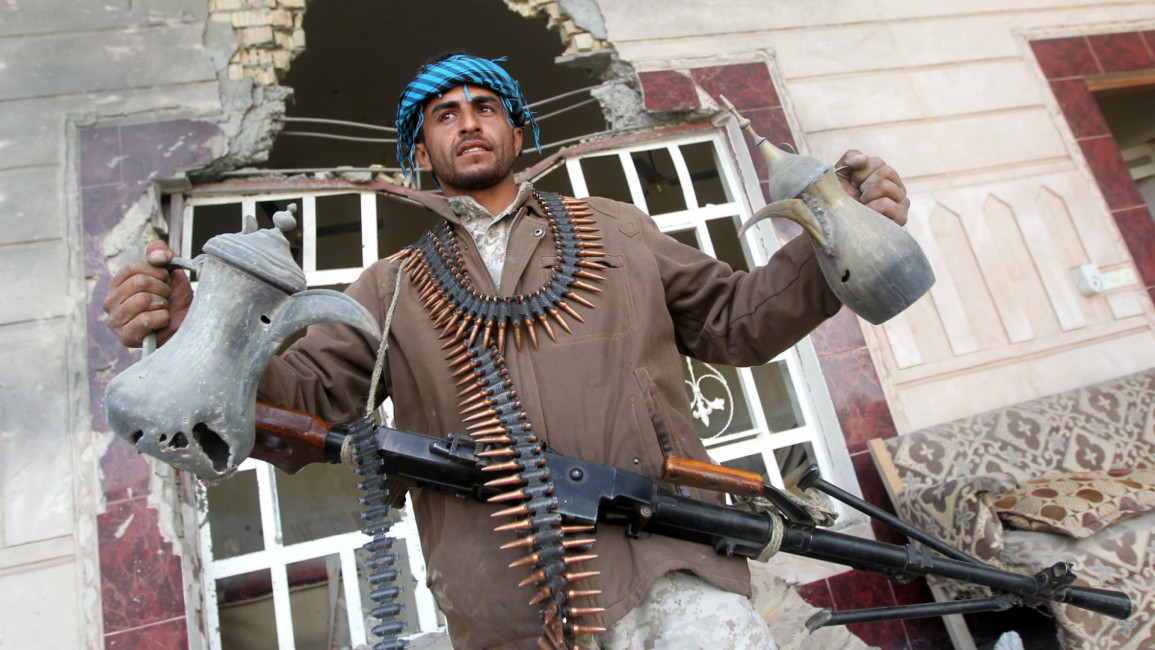IS group 'massacres' members of al-Ubaid tribe in Iraq
IS group 'massacres' members of al-Ubaid tribe in Iraq
Politicians and the media have remained silent about a mass killing of members of an Iraqi tribe, according to local reports.
2 min read
More than 130 members of the Ubaid tribe were reportedly kidnapped and killed [AFP]
More than 100 members of Iraq's al-Ubaid tribe have been massacred by the Islamic State group (IS, formerly known as Isis), according to a tribal elder and locals from the Baghdadi district west of Anbar.
Sheikh Khalaf al-Ubaidi, an elder in the tribe, criticised Anbar Council for remaining silent about the massacres and the media for failing to report them. He believes the federal government asked the media to keep quiet to hide the security forces' failure to stop the massacres.
"Over 130 members of the tribe were abducted and killed by IS," Ubaidi told al-Araby al-Jadeed.
Locals argued that there could be "a disaster worse than the one that happened to the Albu Nimr tribe if the government continues to be selective in its dealing with the security crises".
Hundreds of members of the Albu Nimr tribe were killed by IS last year.
Meanwhile, a number of tribal leaders in al-Karma district, east of Anbar, also disowned the governorate's politicians for their alleged silence over government shelling of residential areas.
"Before God and the Iraqi people, elders from the tribes of al-Halabisa, al-Laheeb and Albu Khalifa have disowned all of Anbar's politicians, whether members of the provincial council, the government or the parliament," Mohammad Hussein al-Halbousi, a member of al-Karma's Council of Elders, told al-Araby al-Jadeed.
Halbousi said government shelling of residential neighbourhoods had caused at least 60 deaths and many more injuries, and he called on the "honourable people of Anbar to withdraw from the political process".
This article is an edited translation from our Arabic edition.
Sheikh Khalaf al-Ubaidi, an elder in the tribe, criticised Anbar Council for remaining silent about the massacres and the media for failing to report them. He believes the federal government asked the media to keep quiet to hide the security forces' failure to stop the massacres.
| The federal government may have asked the media to keep quiet to hide the security forces' failure to stop the massacres. |
Locals argued that there could be "a disaster worse than the one that happened to the Albu Nimr tribe if the government continues to be selective in its dealing with the security crises".
Hundreds of members of the Albu Nimr tribe were killed by IS last year.
Meanwhile, a number of tribal leaders in al-Karma district, east of Anbar, also disowned the governorate's politicians for their alleged silence over government shelling of residential areas.
| Baghdad blamed by MP for mass tribal execution. Read more here |
"Before God and the Iraqi people, elders from the tribes of al-Halabisa, al-Laheeb and Albu Khalifa have disowned all of Anbar's politicians, whether members of the provincial council, the government or the parliament," Mohammad Hussein al-Halbousi, a member of al-Karma's Council of Elders, told al-Araby al-Jadeed.
Halbousi said government shelling of residential neighbourhoods had caused at least 60 deaths and many more injuries, and he called on the "honourable people of Anbar to withdraw from the political process".
This article is an edited translation from our Arabic edition.



